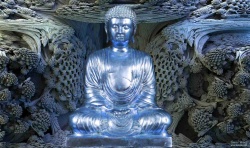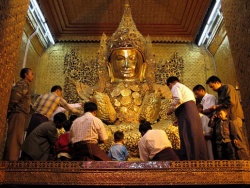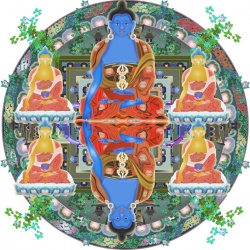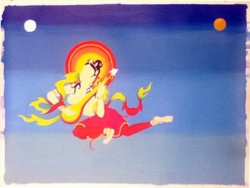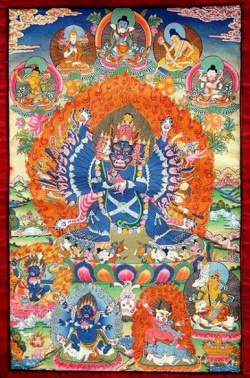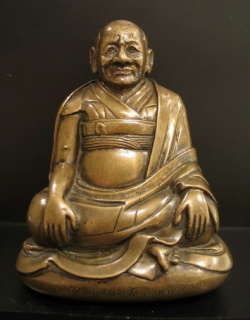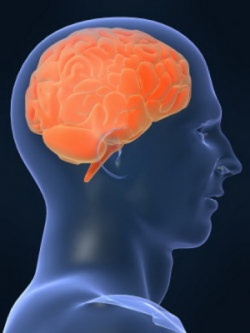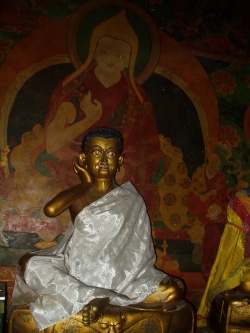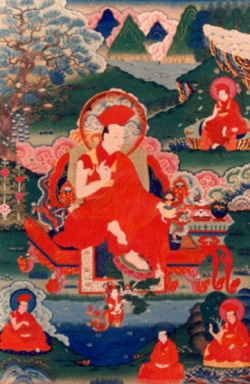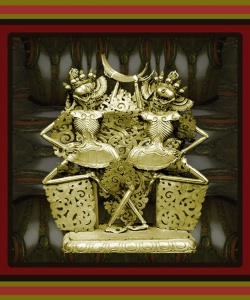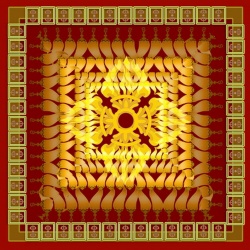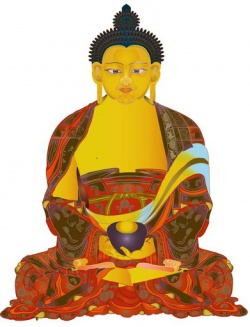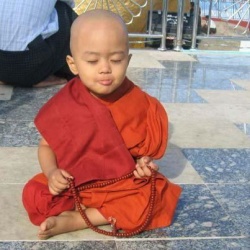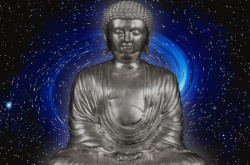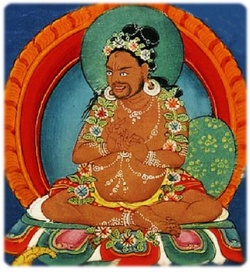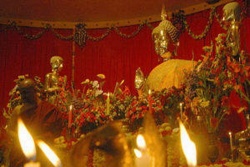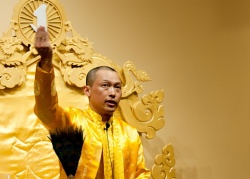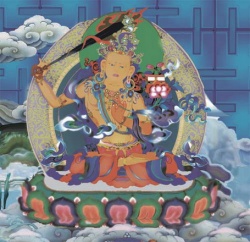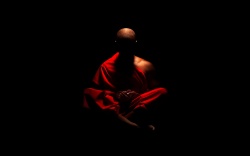Nirvana Sutra: Chapter Thirty-One: Bodhisattva Highly-Virtuous King (e)
Mahayana Mahaparinirvana Sutra
Translated by KOSHO YAMAMOTO
FROM Dharmakshema's Chinese version
The World's genuinely first-ever web edition of this complete scripture
(This "Yamamoto/page edition" is Copyright of Dr. Tony Page, 2004 )
The Complete Kosho Yamamoto English Translation of the "Nirvana Sutra", edited and revised by Dr. Tony Page, typographically improved by Jay and Gabriele Mazo
Chapter Thirty-One: Bodhisattva Highly-Virtuous King (e)
"Also, next, O good man! How does the Bodhisattva-mahasattva practise the Way of the All-Wonderful Sutra of Great Nirvana and perfect the seventh virtue? The Bodhisattva-mahasattva, having practised the Way of the All-Wonderful Sutra of Great Nirvana, thinks: "What is the proximate cause of Great Nirvana? The Bodhisattva knows that four things are the proximate cause of Great Nirvana." A person might say that the practice of all kinds of penance constitutes the proximate cause. But this is not so. Why not? There are no other than four by which one may arrive at Nirvana. What are the four?
"Firstly, one associates with a good teacher of the Way; secondly, one listens to Dharma exclusively; thirdly, one thinks exclusively (about Dharma); fourthly, one practises the Way according to Dharma.
"O good man! As an example: there is a man who has various illnesses - fever, cold, vague weariness, loose bowels, ague, various kinds of evil poisoning - and he goes to a good doctor. The good doctor speaks of medicine in relation to the nature of the illness. The man faithfully follows the doctor's instructions, makes up the medicine as directed and takes it as instructed. On his having partaken of it, his illnesses retreat and he gains health and peace.
"This sick man is analogous to the Bodhisattva; the great doctor is comparable to the good teacher of the Way; the instructions can be compared to the vaipulya sutras; the faithful following of those instructions to meditating upon the vaipulya sutras; preparing the medicine as directed can be compared to practising the Way in accordance with the assisting directions constituted in the 37 Bodhyangas (factors of Enlightenment); curing the illnesses can be compared to the extinction of defilements; and gaining peace and happiness can be compared to the gaining of the Eternal, Bliss, Self, and the Pure of Nirvana.
"O good man! As an example: there is a king who wishes to govern his state in a lawful way and to enable the people to enjoy peace, and he asks his wise ministers how to do this. All the ministers tell of the laws that have obtained until now. The king listens, puts faith in what he has been told, acts faithfully, and governs according to law, and there is nobody who entertains any ill will (against him). Thus the people enjoy peace and have no worries.
"O good man! The king is comparable to the Bodhisattva; all his wise ministers to the good teachers of the Way; what the wise ministers advise the king regarding the lawful governance of his state to the 12 types of sutra; the king's listening and acting faithfully is comparable to the Bodhisattva's meditating upon all the profound meanings of the 12 types of sutra; the lawful administration of the state is comparable to practising the law of all Bodhisattvas, namely the six so-called paramitas; saying that there now remains no enemy is comparable to the Bodhisattva's segregating himself from the bonds of the evil robbers of all the defilements; and attaining peace is comparable to the Bodhisattva's gaining the Eternal, Bliss, Self, and the Pure of Great Nirvana.
"O good man! As an example: there is here a man who contracts hateful leprosy. A good teacher of the Way says to him: "Go to Mount Sumeru and you will see your illness cured. Why? Because there is good, sweet, medicinal amrta (ambrosia) there. Once this has been taken, there is never an instance where a cure does not ensue." The man faithfully follows his words, goes to the mountain, takes the medicine, and obtains the cure for his illness, and there is peace. The case is thus.
"This hateful leprosy is comparable to the common mortal; the good teacher of the Way to all Bodhisattvas; the faithful following (of instructions) to the four immeasurable minds (i.e. of love, compassion, sympathetic joy, and equanimity); Mount Sumeru to the Noble Eightfold Path; the amrta to the Buddha-Nature; the curing of the leprosy to the extinction of defilement; and the attaining of peace to the gaining of the Eternal, Bliss, Self and the Pure of Nirvana.
"O good man! As (another) example: there is a man who has many disciples and who is extremely erudite. He teaches untiringly day and night. It is the same with all Bodhisattvas. Whether all beings believe them or not, they go on teaching untiringly.
"O good man! We say "teacher of the Way". This is none other than the Buddha, the Bodhisattva, pratyekabuddha, sravaka, and those who believe in the vaipulya, etc. Why do we say "good teacher of the Way"? The good teacher of the Way teaches beings well and enables them to do away with the ten evil deeds and practise the ten good deeds. That is why we say "good teacher of the Way".
"Also, next, the good teacher of the Way speaks of the Way just as it ought to be taught and himself acts as he ought to act.
"Why do we say that we speak as we ought to speak and act as we ought to act? We refrain from killing and teach others not to kill. And we have the right view and teach the right view to others. If matters stand thus, we say that such a person is a true, good teacher of the Way. A person practises the Way of Enlightenment and also teaches others the Way of Enlightenment. Thus we say "good teacher of the Way". We practise faith, morality, giving, listening, and Wisdom for our own sake, and also teach others faith, morality, giving, listening, and Wisdom. So, too, we say "good teacher of the Way".
"We say "good teacher of the Way" because there is Wonderful Dharma. What is Wonderful Dharma? One does not seek bliss for one's own sake; one always seeks peace and bliss for others' sake. On seeing a fault in others, one does not reproach them with their shortcomings, but always speaks what is purely good. So we say "good teacher of the Way".
"O good man! The moon that hangs in the heavens waxes from the first of the month up to the fifteenth. So do things obtain with the good teacher of the Way. One causes all those who study the Way to segregate themselves from evil and to grow in good deeds.
"O good man! If a person who approaches a good teacher of the Way does not have: 1) maintenance of sila (morality), 2) samadhi (deep meditation), 3) Wisdom, 4) liberation and 5) knowledge of liberation (i.e. “asamasama-panca-skandha”: the fivefold-body concept of the Buddha, which refers to Enlightenment itself), these will come about. If these are not (yet) perfect, they will grow. Why? Because of associating with a good teacher of the Way. Through such association, a person comes to the profound meaning of the 12 types of sutra. When a person comes to the profound meaning of the 12 types of sutra, we say that he has heard Dharma. To hear Dharma means none other than to hear the Mahayana vaipulya sutras. To hear the vaipulya is to hear Dharma. True hearing is none other than hearing the teaching of the Sutra of Great Nirvana. In the Great Nirvana, we see the Buddha-Nature, and we hear that the Tathagata does not ultimately enter Parinirvana. Hence, we say that we excusively hear Dharma. Exclusively hearing Dharma is none other than the Noble Eightfold Path. By means of the Noble Eightfold Path, we thoroughly do away with greed, hatred and delusion. Hence, hearing Dharma.
"Now, hearing Dharma relates to the 11 shunyatas. Due to these voids, we see no form in anything. Now, hearing Dharma begins with the first aspiration and proceeds up to the ultimate unsurpassed Bodhi Mind. By gaining the first aspiration, one gains Great Nirvana. Through hearing, one does not gain Great Nirvana; by practising, one attains Great Nirvana.
"O good man! As an illustration: a person suffering from illness might hear of a medicinal teaching or the name of a medicine, but cannot gain a cure for his illness. By partaking (of the medicine), he can make away with it. A person might well hear of the depths of meaning of the 12 links of interdependent origination, but he cannot make away with all the defilements. Segregation can only result when, with a careful mind, he meditates upon (such matters). This is the third careful meditation.
"And again, why do we say "careful meditation"? This is none other than the three samadhis of the Void, non-thought, and non-doing. We say "Void". This is seeing nothing that is real in the 25 existences. Non-doing means that one has no desire to possess the 25 existences. Non-form means that one sees no form in the ten characteristics, namely of: colour, sound, smell, taste, touch, birth, abiding, death, male, and female. The practice of the three samadhis is the Bodhisattva's careful meditation.
"What is the practising of the Way by Dharma? Practising by Dharma is to practise danaparamita or up to prajnaparamita. This is to know the true state of the five skandhas, the 18 (sensory) realms and the 12 (sensory) spheres, and sravakas and pratyekabuddhas walk one and the same way, and that this leads to Nirvana.
"“Dharma is the Eternal, Bliss, the Self and the Pure, non-birth, non-ageing, non-illness, non-death, non-hunger, non-thirst, non-suffering, non-worry, non-retrogressiveness, and non-drowningness.”
"O good man! One who knows the meaning of Great Nirvana realises the fact that all Buddhas do not ultimately enter Nirvana.
"O good man! The foremost and true teacher of the Way is the so-called Bodhisattva and the All-Buddha-World-Honoured One. Why? Because they are always well trained in three things. What are the three? The first is uttermost gentle words; the second is uttermost reproach; and the third is gentle words and reproaching. Due to these, the Bodhisattvas and Buddhas are the best good teachers of the Way.
"Also, next, the Bodhisattvas and all Buddhas are good doctors. Why? They know illnesses and medicines and prescribe medicine in accordance with the illness. For example, a good doctor is well versed in eight things. He first sees the nature of the illness, which is threefold. What are the three? They are: wind, heat, and water. To one who suffers from wind he gives butter; to one suffering from fever he gives sugar; to one suffering from water he gives a decoction of ginger. He knows the cause of the illness, gives medicine, and a cure ensues. So we say "good doctor". It is the same with the Buddha and Bodhisattvas. They know that all beings possess the three kinds of illness, which are: greed, anger, and ignorance. One suffering from the illness of greed is taught to meditate on white bones; one suffering from anger is taught loving-kindness; one suffering from ignorance is made to meditate on the 12 links of interdependent origination. So we call all Buddhas and Bodhisattvas good teachers of the Way. O good man! For example, since a master mariner passes people across to the other shore, we call him a great master mariner. It is the same with all Buddhas and Bodhisattvas. They pass all beings across the great ocean of birth and death. So they are good teachers of the Way.
"Also, next, O good man! It is because beings are made to practise the cause of good by Buddhas and Bodhisattvas. O good man! Just as, for example, the Himalayas are the basic place where all kinds of wonderful medicine can be found, so is it the same with the Buddhas and Bodhisattvas. They are the place where goodness springs forth. So we say good teachers of the Way. O good man! In the Himalayas, we have a very fragrant medicine called "saha". If one sees this, one can be blessed with immortality, and when one sees it, there will be no pain of illness. Even the four poisons cannot harm one. If one touches it, one's life extends up to 120. If meditated upon, one can read one's own past. Why? Because of its medicinal power. It is the same with all Buddhas and Bodhisattvas. If one sees them, one can make away with all the worries of defilement. The four Maras cannot wreak their havoc. (If this medicine is) touched, one cannot die an untimely death. It is birthlessness and deathlessness, retrogressionlessness and drowninglessness. To touch means to be with the Buddha and hear his sermons. (These having been) meditated on, one attains unsurpassed Enlightenment. Hence, we call Buddhas and Bodhisattvas the good teachers of the Way.
"O good man! In Gandhamadana there is a lake called Anavatapta. From this lake emerge four rivers, namely: the Ganges, Indus, Sita, and Vaksu. Worldly people always say: "Any sinful person will gain absolution if he bathes in these rivers." Know that all this is false and not true. Other than this, what can be true? All Buddhas and Bodhisattvas take this as true (i.e. bathing in the company of Buddhas and Bodhisattvas gives absolution). Why? Befriending these, one can do away with all sins. So we say "good teachers of the Way".
"Also, further, O good man! As an illustration: all the medicinal trees, all the forests, cereals, sugar-cane, flowers and fruits of the great earth are about to perish on encountering a long drought, until the naga kings, Nanda and Upananda, pitying the people, come out of the great sea and bestow sweet rain. And all the forests and bushes, hundreds of cereals, grass and trees receive moisture and return to life. It is the same situation with all beings. When the root of good is about to die out, all Buddhas and Bodhisattvas enact loving-kindness and cause the rain of amrta (Immortality) to fall from the sea of Wisdom and enable all beings to be perfect again in the ten good deeds. Therefore, we call all Buddhas and Bodhisattvas the good teachers of the Way.
"O good man! A good doctor is well versed in the eight medicinal arts. When he sees a patient, he does not see his caste, rightness in attitude or ugliness, wealth or treasure. And he cures all. So we say "great doctor". The same is the case with all Buddhas and Bodhisattvas. They see the illness of defilement of all beings, but not their caste, their good or bad outer garb, wealth or treasure. With a mind of loving-kindness, they speak of Dharma. Having heard this, beings do away with the illness of defilement. For this reason, alll Buddhas and Bodhisattvas are called the good teachers of the Way. Befriending (such) a good friend, one approaches Mahaparinirvana.
"How does the Bodhisattva approach Mahaparinirvana just by giving ear to Dharma? All beings, when they hear Dharma, gain the root of faith. When one gains the root of faith, one's mind cares to look towards giving, morality, patience, effort, meditation, and Wisdom, by which one reaches the stages of srotapanna up to Buddhahood. Thus one should know that it is due to giving ear to Dharma that one arrives at Wonderful Dharma.
"O good man! As an example: a rich man has an only son. He sends this son abroad and sells what he has. He points out to him where the road is closed or open, and warns him to take care. He says: "Should you encounter a lusty woman, take care not to befriend her. If you come into close relations with her, you will lose your life and wealth. Also, take care not to befriend any bad persons." The son follows his father's words. He is safe and obtains much wealth. The same is the case here. So do matters stand with the Bodhisattva-mahasattva, who expounds Dharma for beings' sake. He points out to all beings and to the four classes of the Sangha where the road is passable and where it is closed. All these people, as they give ear to the teaching, are able to do away with all evil and be perfect in Wonderful Dharma. For this reason, one approaches Mahaparinirvana by giving ear to the teaching.
"O good man! For example, just as a clear mirror fully reflects one's features, so does it obtain with giving ear to the teaching. If one looks into this, one clearly sees what is good and evil, and nothing is concealed. For that reason, giving ear to Dharma brings one near to Mahaparinirvana.
"O good man! There is, for example, a merchant who desires to reach a beach of treasures, but does not know the way. A man points the way out to him. Following his words faithfully, he reaches the beach of treasures and obtains innumerably diverse good things. It is the same with all beings. They wish to reach a good place and come upon treasures, but do not know where the way is blocked or open. The Bodhisattva shows them this. The beings follow the way indicated and reach the good place, and arrive at unsurpassed Nirvana. Hence, giving ear to Dharma enables one to draw near to Mahaparinirvana.
"O good man! For example, there is an intoxicated elephant, which is mad and behaves badly and means to harm people. But when the driver pricks its head with a great iron hook, it immediately becomes obedient, with its evil intention of harming totally gone. The same with all beings. Due to the intoxication of greed, anger and ignorance, they mean to do evil. But all Bodhisattvas suppress this with the hook of giving ear to Dharma, and they no more can raise the mind towards any evil. For this reason, we say that giving ear to Dharma enables one to draw close to Mahaparinirvana. That is why I say here and there in the sutras that as my disciples practise the 12 types of sutra exclusively, they make away with the five shadowings (“pancavaranani; perhaps the five “nivaranas ("obstructions", "hindrances", "coverings") are meant here, i.e. desire; anger; drowsiness and torpor; excitability and remorse; and doubt) and practise the seven factors of Enlightenment (i.e. mindulness; discriminative investigation of Dharma; vigour; joy; tranquillity in body and mind; samadhi; and equanimity). By practising the seven factors of Enlightenment, one draws near to Mahaparinirvana. On hearing Dharma, a person of the stage of srotapanna segregates himself from fear. How so? The rich man, Sudatta, being seriously ill, greatly fears. He hears that Sariputra says that a srotapanna has four virtues and ten consolations. When he hears this, fear leaves him. Thus, giving ear to Dharma enables one to come near to Mahaparinirvana. How? Because one gains the Dharma-Eye.
"There are three types of person in the world. The first has no eyes; the second has one eye; and the third has two eyes. The person with no eyes does not always listen to Dharma. The person with one eye listens to Dharma for a time, but his mind is not settled. The person with two eyes listens with an exclusive mind and acts just as he has heard. Of hearing, we know that there are three such kinds. For this reason, giving ear to Dharma brings one close to Mahaparinirvana.
"O good man! I once was in Kusinagara, when Sariputra became sick and was suffering from an illness. At that time, I looked back to Ananda and had him speak extensively of Dharma. Then Sariputra, having heard this, said to his four disciples: "Put my bed on your shoulders and carry me to the Buddha. I desire to hear Dharma." Then the four disciples carried him to the Buddha, at which he was able to hear the sermon. Through the power of hearing (the sermon), pain left him and he gained peace. The case is such. For this reason, giving ear to Dharma makes one come near to Mahaparinirvana.
"How can the Bodhisattva approach Mahaparinirvana by thinking? Because he gains emancipation of mind by this thinking. How? All beings are always chained to the five desires. Through thinking, he attains emancipation. For this reason, we say that one approaches Mahaparinirvana through thinking.
"Also, next, O good man! All beings always have upside-down views as regards the Eternal, Bliss, the Self, and the Pure. By thinking, they can see that all dharmas are non-eternal, non-bliss, non-Self, and non-pure. Thinking thus, they segregate themselves from the four upside-downs (i.e. the four inversions). For this reason, we say that by thinking one draws near to Mahaparinirvana.
"Also, next, O good man! There are four phases to all things. What are the four? The first is the phase of birth; the second the phase of ageing; the third the phase of illness; and the fourth the phase of extinction. These four cause all common mortals, up to srotapanna, great pain. Those who well think about (these matters) do not experience pain, even when they encounter these four. For this reason, we say that by thinking one approaches Mahaparinirvana.
"Also, next, O good man! There are no good dharmas that are gained by ways other than by thinking. Why not? Even though one might give ear with an undivided mind to Dharma over the course of innumerable, boundless asamkhyas of kalpas, there cannot be any attainment of unsurpassed Enlightenment unless one thinks. Thus, by thinking one approaches Mahaparinirvana.
"Also, next, O good man! If all beings believe in the fact that there is no change in the Buddha, Dharma and Sangha, and gain a respectful mind, know that all this thus comes about by reason of this mindfulness and thinking and that they thus make away with all defilements. Thus, thinking makes one come near to Mahaparinirvana.
"How does a Bodhisattva practise the Way as directed? O good man! He segregates himself from all evil and practises good. This is practising the Way in accordance with Dharma.
"Also, next, how does one practise the Way in accordance with Dharma? One sees that all dharmas are void and have nothing to possess, and that all dharmas are non-eternal, non-bliss, non-Self, and non-purity. Seeing things thus, one does not transgress, even if it means sacrificing one's own body and life. This is how the Bodhisattva practises the Way in accordance with Dharma.
"Also, next, how does one practise the Way in accordance with Dharma? Of practising there are two kinds. One is true and the other non-true. In what is non-true, one does not know the phases (i.e. elements) of Nirvana, the Buddha-Nature, the Tathagata, Dharma, the priest, the real state, and the Void. This is what is non-true.
"What is the True? One knows well the phases of Nirvana, the Buddha-Nature, the Tathagata, Dharma, the priest, the Real State, and the Void. This is what is True.
"What is the phase (i.e. nature) of Nirvana? In the phase of Nirvana, there are in all eight phases (aspects). What are the eight? These are: 1) Ending, 2) Good Nature, 3) the Real, 4) the True, 5) the Eternal, 6) Bliss, 7) the Self, and 8) the Pure. These are Nirvana."
"Also, there are eight things. What are the eight? They are: 1) liberation, 2) good nature, 3) the non-real, 4) the non-true, 5) the non-eternal, 6) non-bliss, 7) the non-Self”, and 8) non-purity.
"Also, there are six phases, namely: 1) liberation, 2) good nature, 3) the non-real, 4) the non-true, 5) peace, and 6) purity. There may be beings who segregate themselves from defilement by way of what obtains in the world. There may be eight things in Nirvana. Then the liberation is not real. Why not? Because of the non-eternal. When there is not the Eternal, there cannot be the Real. When there is not the Real, there is not the True. One might do away with defilement, but it will rise up again. Hence, the non-eternal, non-bliss, non-Self, and non-purity. These are the eight things of liberation of Nirvana.
"What are the six phases? Sravakas and pratyekabuddhas speak of liberation when they cut away defilement. Yet they do not attain unsurpassed Enlightenment. So we say the non-Real. Being not the Real, it is not the True. They will gain unsurpassed Enlightenment in days to come. Hence, non-eternal.
"On gaining the undefiled Noble Eightfold Path, we speak of pure Bliss. O good man! When this is known, there is Nirvana. We do not call this the Buddha-Nature, the Tathagata, Dharma, the priest, the Real State, or the Void.
"How does the Bodhisattva know the Buddha-Nature? There are six aspects to the Buddha-Nature. What are the six? They are: 1) the Eternal, 2) the Pure, 3) the Real, 4) the Good, 5) the Visible, and 6) the True.
"Also, there are seven things, namely: what is attestable, plus the other six stated above. This is called how the Bodhisattva comes to know of the Buddha-Nature.
“"How does the Bodhisattva know the form of the Tathagata? The Tathagata is a form of Awakening and of Good. He is the Eternal, Bliss, the Self, and the Pure, and is” “Liberation and the True. He is the pointing out of the Way and is visible.” This refers to what the Bodhisattva knows the form of the Tathagata to be.
"In what way does the Bodhisattva know about Dharma? By Dharma is meant (seeing) the Good or non-Good, the Eternal or non-Eternal, Bliss or non-Bliss, Self or non-Self, Pure or non-Pure, Knowing or not Knowing, Understanding or not Understanding, the True or the not-True, Practice or non-Practice, Teacher or non-Teacher, the Real or the non-Real. This is how the Bodhisattva knows the phase of Dharma.
"How does the Bodhisattva know the phase of a priest? The priest is the Eternal, Bliss, Self, and the Pure. This is the phase of a disciple. It is a form visible. It is the Good and True, and is not real. Why? Because all sravakas gain the Buddhist teaching. Why do we say True? Because the person is awake to “Dharmata” (Dharma-Essence). This is what we mean when we say that the Bodhisattva knows the form of the priest.
"How does the Bodhisattva know the Real State? These are: the Eternal or non-Eternal, Bliss or non-Bliss, Self or non-Self, Pure or non-Pure, Good or non-Good, "is" or "not-is", Nirvana or non-Nirvana, Liberation or non-Liberation, Knowing or not Knowing, (defilement) being cut off or not cut off, to attest or not to attest, to practise or not to practise, to see or not to see. These are the Real State. This is not Nirvana, the Buddha-Nature, the Tathagata, Dharma, the priest or the Void. This is the sense in which we speak of the Bodhisattva's knowing, as he practises all such Great Nirvana, the different phases of Nirvana, the Buddha-Nature, the Tathagata, Dharma, the priest, the Real State, and the Void.
"O good man! The Bodhisattva-mahasattva practises the Way of the All-Wonderful Great Nirvana Sutra, but he does not see the Void. Why not? The Buddha and the Bodhisattvas have the five eyes. These are not what can be seen. Only with the Eye of Wisdom can one truly see. This is what the Eye of Wisdom can see. There is no thing to be seen. So we say "to see". If we term whatever is not as the Void, this Void is the real. As it is real, there is the eternal "not-is". Being "not-is", there is no Bliss, Self or Purity.
"O good man! The Void is called "no thing". "No thing" is the Void. For example, in the world, when nothing is there, we say "empty". The same is the case with the nature of "space" (“akasha” - i.e. space, wherein a thing can exist and where there is nothing that obstructs existence). As there is nothing to possess (here), we say "empty".
"O good man! Both the nature of all beings and that of space have no real nature. Why not? This is as when we say "empty" when we make away with what there is. The case is like this. Besides, this space is, truth to tell, not to do anything with. Why? Because there is nothing to exist. As it is not "is", we can know that there can be no saying "not-is". If the nature of space were something made, it would have to be non-eternal. If it were non-eternal, we would not call it space.
"O good man! The people of the world say: "Space has no colour, nothing that obstructs, and no change". The case is thus. That is why we say that the nature of space is the fifth great element. O good man! And this space has no nature (for us) to name. Being a light, it is called space. And there is no space. It is as with secular truth, which really does not have its own nature (for us) to name and which is only said so to exist for the sake of beings.
"O good man! The same is the case with the body of Nirvana. There is no place where it is. When all Buddhas do away with defilement, we call this Nirvana. Nirvana is at once the Eternal, Bliss, the Self, and the Pure. We say that Nirvana is Bliss. But it is no feeling of Bliss. This is the all-wonderful, unsurpassed silence and extinction. The All-Buddha-Tathagata has two kinds of Bliss. One is that of silence and extinction; the second is the "Bliss that is sensed by the sense-organs". There are three Blisses in the body of the Real State, which are: 1) the feeling of Bliss, 2) the Bliss of silence and extinction, and 3) the Bliss of sensing. The Buddha-Nature is a single Bliss, as it is what is to be seen. When one gains unsurpassed Bodhi, we call this the Bliss of Bodhi."
Then Bodhisattva-mahasattva Highly-Virtuous King said to the Buddha: "O World-Honoured One! You say that when defilement is done away with, there is Nirvana. But this is not so. Why not? The Tathagata in days gone by, when you attained Bodhi, went to the River Nairanjana. Then King Mara, with his retinue, went to where the Buddha was and said: "O World-Honoured One! It is now time that you enter Nirvana. Why do you not enter it?" The Buddha said to King Mara: "I will not. Because I do not now see many learned disciples of mine upholding morality and wise enough to teach beings well." If when defilement is done away with there is Nirvana, all Bodhisattvas had all done away with defilements innumerable kalpas ago. How could it be that they had not attained Nirvana? There is the same segregation. Why should it only refer to all Buddhas alone and not to Bodhisattvas? If segregation of defilement is not Nirvana, why did the Tathagata, in days gone by, speak to the Brahmin, "Birth-Name", and say: "This present body of mine is Nirvana itself?" Also, the Tathagata was once in the state of Vaisali. Mara again beseeched you and said: "The Tathagata, in days gone by, did not enter Nirvana because the disciples could not teach beings well, not having much (in the way) of hearing, upholding the precepts, Wisdom, or sharpness of mind. Now they are perfect in all of these. Why do you not enter Nirvana?" The Tathagata then said to Mara: "You should have no fear that I am now too late. I shall, three months from now, enter Nirvana." If extinction is not Nirvana, why did you yourself state that you would enter Nirvana after three months? O World-Honoured One! If the segregation of defilement is Nirvana, there was Nirvana in the past when you severed yourself from defilement under the Bodhi-Tree. Why should you say that you will enter Parinirvana in three month' times? O World-Honoured One! If it was the case that the Nirvana at the time was not Nirvana, how could you say to the Mallas at Kusinagara that you would enter Parinirvana in the final part of today (i.e. about 4 a.m., or the early part of the dawn)? How could you, who are Truth itself, say such a thing?"
Then the World-Honoured One said to the All-Shining Bodhisattva Highly-Virtuous King: "O good man! If you mean to say that the Tathagata talks overmuch, know that he did away with speaking falsehoods innumerable kalpas past. No Buddhas or Bodhisattvas speak any falsehood, only the truth. O good man! The Papiyas (i.e. Mara, the Devil) you refer to is none other than the one who once beseeched me to enter Nirvana. O good man! And this Mara does not know what Nirvana truly is. Why not? The Papiyas thinks that when I am silent and do not teach, this is Nirvana. O good man! The people of the world think that when one does not speak and does not do anything, one is like death itself. The same is the case with King Marapapiyas. What he says refers to the fact that the Tathagata sits and does not talk to people of Dharma. And he says that the Tathagata has entered Parinirvana.
"O good man! The Tathagata does not say that there is no difference between the Buddha, Dharma, and the priest. What he says is only that there is no difference between the Eternal and the Pure. O good man! The Buddha does not say, either, that the characteristics of the Buddha, the Buddha-Nature, and Nirvana are not different. What he says is that all are Eternal and Unchanging, with no difference. The Buddha does not say, either, that the characteristics of Nirvana and the Real State are not different. What he says is that the Eternal, the "is", the Real, and the Changeless are not different.
"O good man! Then all my disciples call forth disputations. The situation was as with the bhiksus of Kausambi. Acting contrary to what I taught, they violate the prohibitions; they accept imure things as alms and greedily seek profit, and to all white-clad people (i.e. the laity) they praise their own self and say: "I have now gained the undefiled state, the fruition of the srotapanna or arhatship, and so on." They speak ill of other persons, do not respect the Buddha, Dharma and Sangha and the vinaya teachers, and openly say before me: "Such things the Buddha has permitted us to keep, and such and such things the Buddha does not allow us to possess." And going against me, they say: "The Buddha permits all such things." Such evil persons do not believe in my words. For this reason, I say to Marapapiyas: "Have no fear that I am slow. I shall enter Nirvana in three months' time." O good man! Relying on such evil bhiksus, all the sravaka disciples who are still on the way to learning do not see me and do not listen to my words, and they say that the Tathagata now enters Nirvana. Only all the Bodhisattvas well see me and give ear to what I speak of Dharma. So I do not say that I enter Nirvana. Sravaka disciples may say that the Tathagata now enters Nirvana, but, truth to tell, I do not enter Nirvana. O good man! If all of my sravaka disciples say that the Tathagata enters Nirvana, know that such are no disciples of mine. They belong to Mara's clan, the evil people who abide in twisted views and who do not hold the right view of life. If they say that the Tathagata does not enter Nirvana, they are my disciples. They are not comrades of Mara, but men of right view and not evil. O good man! It is not the case that I have ever said that the Tathgata does not teach, but sits silently, and that this is Parinirvana. O good man! For example, there is a rich man who has many sons. He leaves them and goes to other countries and has not yet come home when his sons may say that their father is long since dead. But this rich man is not yet dead. All his sons are upside down (in their view) and think of death. It is the same with my sravaka disciples. Not seeing me, they think: "The Tathagata, at Kusinagara, between the twin sal trees, enters Parinirvana." But, truth to tell, I do not enter Nirvana. The sravaka disciples think in terms of Nirvana.
"O good man! For example, there is a bright lamp. A person puts a cover over it. Other people will think that the lamp has already gone out. Not knowing, they think that the lamp is extinguished. It is the same with my sravaka disciples. They have the Eye of Wisdom and yet are overspread by defilement; their mind is upside-down and cannot see the True Body. And they loosely entertain the idea that I have gone. Yet I am not yet ultimately gone. O good man! A person born blind cannot see the sun and the moon. Not able to see, he does not know that there is night and day. Not knowing this, he says that there truly are no sun and moon. Actually there are the sun and the moon. But the blind man cannot see them. Not seeing them, he gains an upside-down mind and says that there are no sun and moon. It is the same with my sravaka disciples. As with the man born blind, not seeing the Tathagata, they say that the Tathagata has entered Nirvana. The Tathagata, in truth, has not yet entered Nirvana. Due to their upside-down minds, they gain such a thought.
"O good man! For example, when cloud and mist come in the way, the ignorant say that there are no sun and moon. In truth, there are the sun and moon. Because they are obstructed, beings cannot see. It is the same with the sravaka disciples, too. With all the defilements overspreading the Eye of Wisdom, they cannot see the Tathagata, and say the Tathagata has entered Nirvana. O good man! This only derives from the fact that the Tathagata merely "acts like a child". It is not entering into extinction. O good man! When the sun has set in the west in Jambudvipa, beings cannot see it. Because the Black Mountain obstructs their sight. But the nature of the sun has nothing of hiding within it. As beings cannot see, they think there is sundown. It is the same with my sravaka disciples. Obstructed by all the mountains of defilement, they cannot see me. Not seeing me, they think that the Tathagata has truly entered Nirvana. “But truly, there is no extinction with me eternally.” That is why at Vaisali I said to Papiyas: "In three months, I shall enter Nirvana."
"O good man! I long before foresaw” “that the virtues of good amassed by Kasyapa would ripen and bear fruit in three months' time and that, after the ending of the sitting of the varsika, Subhadra of Gandhamadana (i.e. a learned Brahmin who was the last person to enter” “the Buddhist Sangha) would come to my place. That is why I said to Marapapiyas: "In three months' time I shall enter Nirvana." O good man! There are 500 wrestlers. In three months' time they are to aspire to unsurpassed Bodhi. That was why I said to Papiyas: "In three months' time, I shall enter Parinirvana." O good man! As the virtues amassed by Cunda and the 500 Licchavis and Amrapali were to ripen and they were to asire to unsurpassed Bodhi, I said to Papiyas: "In three months' time I shall enter Nirvana."
"O good man! Sunaksatra befriended the tirthikas and Nirgranthaputra. I spoke of Dharma for 12 long years. But the man's mind was twisted, and he would not believe and accept what I said. I foresaw that the root of this man's distorted vision would unfailingly get uprooted. So I said to Papiyas: "In three months' time, I shall enter Parinirvana."
"O good man! Why did I once, in the past, on the bank of the river Nairanjana, say to Marapapiyas: "I do not yet possess any erudite disciples. So I cannot enter Nirvana?" I said this because I wanted to turn the Wheel of Dharma for the five bhiksus at Varanasi (i.e. the five bhiksus sent by the Buddha's father to look after his son). Next, too, this was for the sake of the other five bhiksus, namely: Yasas, Purna-Maitrayaniputra, Vimala, Gavampati, and Subahu.
"Also, this was for the rich man, Ugra, and his 50 people. Also, it was for the sake of Bimbisara, King of Magadha, and innumerable others and those of heaven. Also, it was for the sake of Uruvilva-Kasyapa and his 500 disciple bhiksus. Also, this was for the sake of the two brothers, Nadi-Kasyapa and Gaya-Kasyapa, and their 500 disciple bhiksus. Also, this was for the sake of Sariputra and Maudgalyayana and their 250 bhiksus. That was why I said to Papiyas, the King of Maras, that I would not enter Parinirvana.
"Noble son. There is 'Nirvana', but that is not Maha-nirvana (Great Nirvana). Why is Nirvana not Maha-nirvana? The elimination of the afflictions (kleshas) without having seen the Buddha-dhatu (Buddha Nature) is called 'Nirvana', and not Maha-nirvana. Thus, because one has not seen the Buddha-dhatu, there is no permanence nor Self, though there is bliss and utter purity. Hence, even though the afflictions have been eliminated, this should not be called 'Maha-nirvana'. When one has seen the Buddha-dhatu and eliminated the afflictions, that is called 'Maha-parinirvana'. Because of having seen the Buddha-dhatu, it is stated to be permaennt, Self, blissful, and utterly pure, and therefore that elimination of the afflictions is stated to be Maha-parinirvana.'
(Above passage on Nirvana/ Maha-nirvana, translated by Stephen Hodge). "O good man! "Nir" means "not"; "va" means "to extinguish". Nirvana means "non-extinction". Also, "va" means "to cover". Nirvana also means "not covered". "Not covered" is Nirvana. "Va" means "to go and come". "Not to go and come" is Nirvana. "Va" means "to take". "Not to take" is Nirvana." "Va" means "not fixed". When there is no unfixedness, there is Nirvana. "Va" means "new and old". What is not new and old is Nirvana.
"O good man! The disciples of Uluka (i.e. the founder of the Vaisesika school of philosophy) and Kapila (founder of the Samkhya school of philosophy) say: "Va means charactersitic". "Characteristiclessness" is Nirvana.”
"O good man! Va means "is". What is not "is" is Nirvana. Va means harmony. What has nothing to be harmonised is Nirvana. Va means suffering. What has no suffering is Nirvana.
"O good man! What has cut away defilement is no Nirvana. What calls forth no defilement is Nirvana. O good man! The All-Buddha-Tathagata calls forth no defilement. This is Nirvana.
"The Wisdom that there is is not barred at Dharma (i.e. not obstructed before Dharma). This is so with the Tathagata. The Tathagata is no common mortal, no sravaka, no pratyekabuddha, and no Bodhisattva. This is the Buddha-Nature.
"The Wisdom of the Tathagata's Body and Mind fills innumerable, boundless asamkhyas of lands, with nothing to obstruct it. This is space. "The Tathagata is Eternal and does not change. This is the Real State." Because of this, the Tathagata does not ultimately enter Nirvana.” “This is what we call the Bodhisattva's practice of the Way of the All-Wonderful Great Nirvana Sutra and perfecting the seventh virtue.
"O good man! How does the Bodhisattva practise the Way of the All-Wonderful Great Nirvana Sutra and perfect the eighth virtue?
"O good man! The Bodhisattva-mahasattva practises Great Nirvana and extirpates five things, and segregates himself from five things, accomplishes six things, practises five things, and protects one thing, befriends four things, puts faith in one truth, and his mind emancipates itself, and thoroughly emancipates Wisdom itself.
"O good man! How does the Bodhisattva extirpate five things? These five are so-called: 1) matter (“rupa”), 2) feeling (“vedana”), 3) perception (“samjna”), 4) volition (“samskara”), and 5) consciousness (“vijnana”) - the five skandhas? Why do we say skandha? It truly causes beings to repeat birth and death, and they cannot cut off the heavy burden. There is dispersal and gathering-together, bound up for the Three Times. Try as one might, one cannot gain the true meaning. Because of all these meanings, we say skandha.
"The Bodhisattva-mahasattva sees the "matter-skandha", but he does not see its form. Why not? Though we may seek to gain it in ten forms of matter, we cannot arrive at its nature. We intend to explain it for the sake of the world and we say "skandha".
"Of "feeling", there are 108 kinds. We look into the skandha of feeling. But there is no form to feeling. Why not? Though 108, there is no fixed, real form. Hence, the Bodhisattva does not see the skandha of feeling. The same applies to the skandhas of perception, volition, and consciousness.
"The Bodhisattva-mahasattva sees profoundly in the five skandhas the well-spring of all the ills of defilement. So he puts into effect the means whereby to cut them off.
"How does the Bodhisattva segregate himself from five things? These are the five twisted views (“panca-drstayah”: the five heretical views). What are the five? They are: 1) the twisted view regarding man's carnal existence (“satkaya-drsti”: the heretical view that there is an unchanging entity in the carnal self which can be called an eternal self and regarded as one's own), 2) the one-sided view of "is" or "not-is" (“antagraha-drsti”: the one-sided or heretical view of "is" or "not-is" regarding phenomenal existence, or the "is" or "not-is" view regarding the wrongly accepted notion of Self), 3) the evil view that denies causality (“mithya-drsti”: the evil view that denies the law of causality in regard to what exists), 4) the twisted view of cleaving to one-sided personal opinions (“silavrata-paramarsa”: the heretical view of life which denies the moral precepts and prohibitions and regards what is wrong as true and right), 5) addiction to twisted views and regarding these as correct (“drstiparamarsa”: the heretical world-view in which one cleaves to the satkaya-drsti, the antagraha-drsti, and the mithya-drsti and regards these as true). From these five twisted views spring the 62 evil views of life. Due to these, there is no ceasing of birth and death. Therefore, the Bodhisattva guards himself so that these do not come near (to him).
"How does the Bodhisattva accomplish six things? These six things refer to six thinkings. What are the six? They are: 1) thinking of the Buddha, 2) thinking of Dharma, 3) thinking of the Sangha, 4) thinking of heaven, 5) thinking of giving, and 6) thinking of the moral precepts. These are the six things which the Bodhisattva accomplishes.
"How does the Bodhisattva practise five things? These are the five samadhis, namely: 1) samadhi of knowledge, 2) samadhi of silence, 3) samadhis of the pleasantness of body and mind, 4) samadhi of non-bliss, and 5) surangama samadhi. If one practises these five samadhis, one draws near to Mahaparinirvana. Hence, the Bodhisattva practises with a full mind.
“"In what sense does the Bodhisattva guard one thing? This is Bodhichitta “(i.e. the mind of Enlightenment - the resolve to gain Bodhi). The Bodhisattva-mahasattva always guards this Bodhichitta just as people of the world do their only son. Also, it is as with a one-eyed man who protects the other eye that still remains (to him). It is as when people protect the man who is guiding them through the wilderness. It is the same with the Bodhisattva, who guards his Bodhichitta. “Thus guarding Bodhichitta, he reaches unsurpassed Enlightenment. When unsurpassed Enlightenment has been gained, perfect are the Eternal, Bliss, the Self, and the Pure. This is unsurpassed Mahaparinirvana. Thus the Bodhisattva guards the one Dharma.”
"How does the Bodhisattva draw near to four things? These are the four limitless minds (“catvari-apramanani”). What are the four? They are: 1) Great Loving-Kindness, 2) Great Compassion, 3) Great Sympathetic Joy, and 4) Great Equanimity. By means of these four minds, he calls forth Bodhichitta in the minds of innumerable, boundless numbers of beings. For this reason, the Bodhisattva, with full mind, tries to draw near to this.”
"How is the Bodhisattva one-mindedly obedient? The Bodhisattva knows that all beings turn back to the one Way. The one Way is Mahayana. All Buddhas and Bodhisattvas, for beings' sake,” “break this up into three. For this reason, the Bodhisattva follows obediently and does not transgress.
"How does the Bodhisattva thoroughly emancipate his mind? He eternally does away with the mental states of greed, anger, and ignorance. This is how the Bodhisattva emancipates his mind.
"How does the Bodhisattva thoroughly emancipate himself in his knowledge? The Bodhisattva-mahasattva knows all things and is unhindered. This is how the Bodhisattva emancipates himself in knowledge. Through emancipation in knowledge, he now knows what he once did not know."
Then the All-Shining Bodhisattva-mahasattva Highly-Virtuous King said: "O World-Honoured One! What you the Buddha say regarding emancipation of the mind does not hold good. Why not? The mind originally has nothing that can be bound up. Why not? Originally, the mind is not bound by any such defilements as greed, anger, and ignorance. If there is originally nothing that binds one, how can we say that the mind now gains emancipation? O World-Honoured One! If the mind originally has nothing that can be bound by greed, how can there be any binding? A person might well try to get milk from the horns of a cow, but no milk will come out, try as he might, since there is no (appropriate) nature there for the milk to come out. No milk can come about, however one might try to get the milk. One who milks does not do thus. With little effort, he gains a lot of milk. The same with the mind. If there was originally no greed, how can any greed come about? If there was originally no greed and later there is a bit of greed, we might infer that all Buddhas and Bodhisattvas who originally possessed no greed might now all have it.
"O World-Honoured One! A barren woman, for example, has no capacity for bearing a child. With whatever art and effort, she cannot bear a child. It is the same with the mind. Originally it does not have the nature of greed. In no circumstances whatever can greed then come about.
"O World-Honoured One! Rub wet wood as we may, we will not get any fire. The same is the case with the mind. Try as we may, we will not get any greed. How can the bond of greed fetter the mind?
"O World-Honoured One! However much we might press sand, we cannot gain any oil. It is the same with the mind. We may well press it, but no greed will come out. Know that greed and mind are of different stuff. Though there is greed, how can it defile the mind? O World-Honoured One! For example, a person might try to hang a spike in the air. It can never remain there. It is the same with trying to have greed peacefully chain the mind. No number of however artful efforts can possibly have greed chain the mind.
"O World-Honoured One! How can one emancipate the mind when there is no greed in it? Why do not all the Buddhas and Bodhisattvas extract a prickle from the sky?
"O World-Honoured One! We do not call the mind of the past "emancipated". There is no emancipation of the mind of the future. And the mind of the present, too, does go along with the way. What mind of what world can we call "emancipation"? O World-Honoured One! This is just as the light of the past cannot make away with the gloom. The light of the future cannot make away with the gloom, either. The light of the present also does not make away with the gloom. Why not? Because light and gloom cannot go in parallel. It is the same with the mind. How can we say that the mind gains emancipation?
"O World-Honoured One! It is the same with greed (i.e. lust, desire). If one does not possess greed, one cannot have greed when one sees a woman. If it comes about by the form of the woman, know that this greed truly is an "is". Due to greed, one falls into the three unfortunate realms.
"O World-Honoured One! For example, one sees a woman in a picture and gains the feeling of desire. From gaining desire, various sins result. If originally there is no desire, how can one gain desire by seeing the picture of a woman? If there is no greed in the mind, how can you the Tathagata say that the Bodhisattva gains emancipation of mind? If there is desire in the mind, how comes it that it comes about after having seen (the picture), and that a person who has not seen it does not gain it? I now actually see. An evil return ensues. This shows that I have desire. It is the same with anger and ignorance.
"O World-Honoured One! For example, beings possess a body and not the self. And yet common mortals unreasonably gain the thought of a self. One can have the thought of a self and yet one does not fall into the three unfortunate realms. How can it be that a person with greed (i.e. desire) does not see a womanly form and gains the thought of a woman, and falls into the three unfortunate realms? O World-Honoured One! For example, one rubs wood and obtains fire. And the nature of this fire has no place in any thing. How does it come about? O World-Honoured One! It is the same with greed. In "matter" there is no greed; in smell, taste, touch, and law (dharma ), too, we do not have any greed. And yet, how comes it that a person gains greed in smell, taste, touch, and law? If it is the case that there is no element of greed anywhere, why do only beings acquire greed and the Buddhas and Bodhisattvas do not? O World-Honoured One! The mind, too, is not fixed. If the mind were fixed, there could be no greed, anger, and ignorance. If it is not fixed, how can the mind gain emancipation? Greed, too, is not fixed. If it is not, how can one, through it, fall into the three unfortunate realms? The two things of the person with greed and the world in which he dwells are both not fixed. Why not? Each calls forth one thing and acquires greed, anger, or ignorance. This tells us that the person who has greed and the world he is in are both not fixed. If both are not fixed, why does the Tathagata say: "The Bodhisattva practises the Way of Great Nirvana and gains emancipation of mind?"
Then, the Buddha said to the All-Shining Bodhisattva-mahasattva Highly-Virtuous King: "Well said, well said! The mind does not get bound by the defilement of greed, and also, it is not the case that it does not get bound. This is no emancipation, and it is not that there is no emancipation. It is not "is", and it is not "is-not". It is not the present, nor the past, nor the future. Why not? Because all things have no self of their own.
"O good man! All tirthikas say: "When the causal concatenations harmonise, there are instances in which fruits result. When things have no nature of their own, and when they well come about without any nature of so coming about, there would have to be a result arising even from the birthlessness of space. Because the nature of birthlessness is no cause. This tells us that in all things there is the original nature of fruition (i.e. the engendering of results). Thus do things foregather, and the result comes about. Why? When Devadatta desires to build a bulwark, he takes mud, and not paint. When he desires to draw a picture, he collects paints, and not grass or plants. When making clothes, one uses thread, and not mud and wood. This is as when one builds a house and uses mud, not thread. In accordance with what a man takes, the result will follow. As the result comes about, we can know that in the cause there is unfailingly the (relevant) nature. If there is not any nature to be named (here), one thing could well call forth all things. If one can take up, make, and put out (something), know that there must be the result prior to the coming about. If there is no result, a person will not take up, make, or put (anything) out. The only thing where there is no taking and making is space. Because of this, all things can come about. As there is the cause, the seed of the nyagrodha can live in the nyagrodha tree. So does milk possess sarpirmanda (ghee), thread cloth, and mud a pot."
"O good man! All common mortals are blinded by ignorance. They say definitely: "In paint there definitely is the quality of sticking, and in the mind the nature of greed." Also, we say: "The mind of the common mortal has the nature of greed, which is the nature to be emancipated. If one encounters the causal relations of greed, the mind gains greed. When it encounters emancipation, the mind gets emancipated." Although this is said, it is not so. There are many people who say: Every cause cannot contain a result. There are two kinds of cause. One is minute and the other coarse. What is minute is eternal, and what is coarse is non-eternal. The minute cause shifts onto what is coarse, and from the coarse there later comes about the result. As what is coarse is non-eternal, the result, too, is non-eternal.
"O good man! There are beings who say: "The mind has no cause; greed also has no cause. The greedy mind comes about by season." All such people do not know that all sits in the mind, and they transmigrate through the six realms, repeating birth and death.
"O good man! For example, we put a collar on a dog and chain it to a pillar, and it goes round the pillar the whole day and cannot get away. It is the same with all beings. They wear the fetter of ignorance, are chained to the pillar of birth and death, and repeat lives through the 25 existences, and cannot get away.
"O good man! For example, there is a man who falls into the toilet and gets out, and falls in again. A person is cured of an illness and then contracts the cause of the illness again. A traveller, on his way, comes across a wilderness. After having passed through it, he turns back into it again. A person washes his body and then puts mud on it again. That is how things go with all beings. A person is already out of the stage of the non-possession “bhumi” (i.e. the eighth of the nine stages of mental training, in which one no longer has any sense of possession), and is not yet quite out of the stage of the thoughtlessness-non-thoughtlessness “bhumi” (i.e. the final of the nine stages of mental practice). And he comes back to the three unfortunate realms again. Why? All beings think only of the result and not of the causation. It is as with a dog who goes after a piece of mud, and not after the man himself. It is the same with the common mortal. He only thinks of the result and not of the causal relations. Not thinking of this, he draws back from the stage of the “bhumi” of thoughtlessness-non-thoughtlessness and falls into the three unfortunate realms.
"O good man! All Buddhas and Bodhisattvas do not definitely say that the cause embosoms the result, no result rests in the cause, or "is" has no result, or that "is-not" is resultless. If we say that there definitely is a result in a cause, or that there definitely is no result in a cause, or that there definitely is no result in "is", or that "is-not" is definitely resultless, know that we belong to the clan of the Maras. We belong to the class of Mara. We are those belonging to "craving" (“trsna”). Such a person of craving cannot eternally do away with the bond of birth and death. Such a person does not know what obtains regarding the mind and greed.
"O good man! All Buddhas and Bodhisattvas show us the Middle Path. Why? Things can be "is-not" or "not-is-not". But nothing can ever be definite. Why not? Because consciousness comes about through the eye, colour, brightness, mind, and thinking. Now, this consciousness is never definitely in the eye, in colour, brightness, mind, or thinking. Also, it is not in between; it is not in "is", nor is it in "is-not". As it comes about through causal relations, we say "is". As it has no nature of its own, we say "is-not". That is why the Tathagata expounds and says: "All things are not "is" and not "is-not".
"O good man! All Buddhas and Bodhisattvas do not say definitely that there is the nature of purity or the nature of non-purity in the mind. Because there is no definite place where the mind that is pure or the mind that is not pure exists. Through causal relations there comes about greed. So we say "not-is-not". As there is originally no nature of greed, we say "is-not".
"O good man! Through causal relations, the mind acquires greed; through causal relations, the mind can liberate itself."
Chapter Thirty-Two: Bodhisattva Highly-Virtuous King (f)
"O good man! When there is the causal relation (of greed), the mind of greed (i.e. the mental state of greed/desire) comes about; it so exists, and dies with greed. There is the case where the mind comes about with greed, it so exists, and does not die with greed. There is the case where it does not come about with greed, it exists with greed, and it so dies. There is the case where it does not come about with greed, it does not exist with greed, and it so dies.
"How does the mind come about together with greed, exist with greed, and so die? O good man! If the common mortal does not cut off the mind of greed and practises the mind of greed, such a person is one whose mind comes about together with greed. All beings do not cut off the mind of greed. It comes about with greed, and it dies out with greed. To all beings of the world of desire there is spread a table of the first stage of dhyana. Practised or not practised, all is ready for accomplishment. Only through causal relations does this come out to one. The causal relation is none but the fire. So do things obtain with all common mortals. Whether practised or not practised, the mind comes about along with greed, and it dies along with greed. Why? Because the root of greed has not been extirpated.
"How does the mind come about along with greed and not die along with greed? The sravaka disciple gains greed through causal relations. As he is afraid, he meditates on white bones. This is why we say that the mind comes about along with greed and that it does not die along with greed. Also, there is the situation where the mind comes about along with greed and does not die along with greed. There is a sravaka who is not yet accomplished in the four fruitions (of Hinayana practice). Through causal relations, he gains a mind of greed, but gaining the four fruitions, the mind of greed dies. Thus do things go. This is where we say that the mind comes about along with greed and does not die along with greed.
"When the Bodhisattva-mahasattva gains the immovable stage (i.e. the eighth of the 10 Bodhisattva stages of development), the mind comes about along with greed and does not die along with greed.
"In what way do we say that the mind does not come about along with greed and that it dies together with greed? When the Bodhisattva-mahasattva extirpates the mind of greed, but displays, for the sake of beings, that he yet has greed. As this is for the sake of display, innumerable, boundless numbers of beings gain, perfect and accomplish good things. This is where we say that the mind does not come about along with greed, but dies along with greed.
"How do we say that the mind does not come about along with greed and that it does not die along with greed? This refers to Bodhisattvas other than the arhat, pratyekabuddha, all Buddhas, and those of the immovable stage. This is where we say that the mind does not come about along with greed and that it does not die along with greed. For this reason, we do not say that all Buddhas and Bodhisattvas are by nature pure in mind, and we do not say that they are by nature not pure. O good man! This mind does not melt into that of greed; also it does not melt into that of anger and ignorance.
"O good man! For example, the sun and moon become obscured from sight by smoke, dust, cloud, mist, and the Asura (i.e. a Titan who, when fighting the sun and moon, obstructs their light by spreading out his hands). Because of these things, no being can see (the sun and moon). Though not seen, the nature of the sun and moon does not, after all, melt into one with the five overshadowings (“panca-avaranani”). It is the same with the mind. Through causal relations, the bond of greed comes about. Beings say that the mind melts into one with greed, but the nature of the mind truly does not melt into one. If the greedy mind were the nature of greed, and if non-greed were the nature of non-greed, we could not make the mind of greed greed, and the mind of greed could not become that of non-greed. O good man! For this reason, the bond of greed cannot defile the mind. All Buddhas have eternally done away with the mind of greed. On that account, we say that one gains liberation of mind. This is said because all beings gain the bond of greed through causal relations, and through causal relations they attain liberation. O good man! For example, this is as with a precipice in the Himalayas. A man cannot go along it with a monkey. There might be a place where the monkey can go on his own, but not the man. Or there might be a place where both man and monkey can go. O good man! Where both man and monkey can go, a hunter places a table, on which he deposits birdlime and catches the monkey. As the monkey lacks intellect, he touches the lime with his hands. Through touching it, his hands get stuck. To free his hands, he touches the lime with his feet. His feet get stuck. To get his feet free, he bites (at the birdlime) with his mouth. His mouth further gets stuck. Thus, the five parts (of the monkey) are unable to get free. Then the hunter pases a staff through the monkey (i.e. kills the monkey) and returns home.
"The steep precipice in the Himalayas is the Right Path, along which the Buddha and Bodhisattvas walk; the monkey is comparable to all common mortals; the hunter is Marapapiyas; the birdlime is the bond of greed. Man and monkey being unable to walk together is analogous to all common mortals being unable to walk together with Marapapiyas. We say that the monkey can go and that man cannot: this is comparable to the fact that even the tirthikas who have intelligence and all devils cannot draw one to the bait even with the five desires. We say that man and monkey go well together: this means that all common mortals and Marapapiyas are always lost in birth and death and cannot properly practise the Way. Common mortals are bound up by the five desires, so that Marapapiyas can easily catch them and carry them away. This is like the hunter who catches the monkey with birdlime and takes him back home.
"O good man! If the king remains in his own country, his body and mind will be at ease; if abroad, he will have to suffer from many things. So do matters stand with all beings. If one lives in one's own domain, one is in peace. But out of one's own domain, one comes across devils and has to suffer from all manner of worries. One's own domain refers to the four thinkings, and the place of others to the five desires.
"How do we say that one belongs to Mara? All beings see the non-eternal as the Eternal, the Eternal as the non-Eternal, Suffering as non-Suffering, Bliss as Suffering, the Impure as the Pure, the Pure as the Impure, the non-Self as the Self, the Self as non-Self, what is not true Emancipation carelessly as Emancipation, true Emancipation as non-Emancipation, non-Vehicle as Vehicle, and Vehicle as non-Vehicle. Such people belong to the class of the Maras. One who belongs to Mara does not have a pure mind.
"Also, next, O good man! If a person truly sees all things as "is" and general and individual forms as fixed, know that this person will - when he sees any concrete thing - see as though looking at a concrete thing. This will apply down to consciousness. When he encounters consciousness, he will entertain the thought of having had a consciousness (of something). Seeing a man, he will see the form of a man; seeing a woman, the form of a woman; seeing the sun, the form of the sun; seeing the moon, the form of the moon; seeing the form of age, the form of age; seeing a skandha, the form of a skandha; seeing a sense-sphere, the form of a sense-sphere; seeing a sense-realm, the form of a sense-realm. Any such person is the kindred of Mara. One who is the kindred of Mara does not possess a pure mind.
"Also, next, O good man! A person might come to think that the Self is matter (“rupa”), that the Self exists in matter; that there is matter in the Self, that matter belongs to the Self. Or he may view the Self as consciousness, or think that the Self exists in consciousness, that consciousness exists in the Self, that consciousness belongs to the Self. Any such person who views things thus belongs to Mara; any person who see things thus is not my disciple.
"O good man! My sravaka disciples part from the 12 types of sutra of the Tathagata and learn and practise the various kinds of books of the tirthikas; not studying the works of renunciation and silent extinction of a priest, they exclusively perform what secular people do. What are the works of the secular world? What are the impurities? They receive and keep all such things as male and female menial servants, fields and houses, elephants, horses, vehicles, donkeys, mules, fowls, dogs, pigs, sheep, and all kinds of cereals, from barley to wheat. They part from their teachers and priests, and associate with the laity. Acting contrary to the holy teaching, they address white-clad (i.e. lay) people and say: "The Buddha permits the bhiksus to receive and keep various impure things." This is where we speak of people learning things of the secular world.
"There are various disciples who, not acting for Nirvana, approach and give ear to the 12 types of sutra and don priestly robes or greedily eat those things intended for priests who have come from afar, as though they were their own things. They feel jealousy and resentment when they hear of the praise and fame of other families. They associate with the king and all princes, are interested in good and bad fortune (i.e. they go in for fortune-telling), guess at the waxing and waning of the moon. They love and befriend chess, gambling, chobo (i.e. a gambling game), throwing arrows into a pot, bhiksunis (nuns), girls, and keeping two sramaneras. They always visit the houses of butchers, hunters, bars, and the places where candalas live. They sell and buy, they make food themselves, they receive messengers from neighbouring countries and give news. Know that such people are kindred to Mara and are no disciples of mine. Thus, the mind comes about with greed and thus dies with greed. This applies down to the ignorant mind, which emerges together (with ignorance) and dies out together (with ignorance). O good man! For this reason, it is not the case that the nature of the mind is pure or not pure. Hence, I say that one gains liberation of mind.
"If a person does not receive and store (impure things), but - for the sake of Great Nirvana - upholds, recites, copies and explains to others the 12 types of sutra, know that such a person is truly my disciple. Such a person does not perform what belongs to the world of Marapapiyas; such a person learns and practises the 37 elements of Enlightenment. Learning and practising the Way, such a person does not come about together with greed and does not die together with greed. This is what we mean when we say that the Bodhisattva practises the All-Wonderful Great Nirvana Sutra and perfects and accomplishes the eighth virtue."
"Also, next, O good man! How does the Bodhisattva-mahasattva practise the All-Wonderful Great Nirvana Sutra and perfect and accomplish the ninth virtue? O good man! The Bodhisattva-mahasattva practises the Way of the All-Wonderful Great Nirvana Sutra and first calls forth five things and perfects these. What are the five? These are: 1) faith, 2) a straight mind, 3) the moral precepts, 4) associating with a good friend, and 5) erudition.
"What is faith? The Bodhisattva-mahasattva believes that there is recompense in the Three Jewels and in giving. The two truths (i.e. relative and ultimate) and the Way of the One Vehicle (“ekayana”) are not different. He believes that all Buddhas and Bodhisattvas classify things into three, so that all beings quickly gain Emancipation. He believes in “Paramartha-satya” (the truth of Ultimate Reality) and good expedient means. This is faith.
"A person who believes thus cannot be beaten by any sramanas, Brahmins, Marapapiyas, Brahma, or anyone. When a person grounds himself in this faith, he gains the nature of a holy sage. One practises giving, and this - whether big or small - all leads to Mahaparinirvana, and thus one does not fall into birth and death. It is the same with upholding the moral precepts, hearing the Way, and Wisdom, too. This is faith. Though one may have this faith, one does not yet see. This is how the Bodhisattva practises the Way of Great Nirvana and perfects the first thing.
"What is the straight mind? The Bodhisattva-mahasattva maintains a straight mind towards all beings. All beings flatter, as occasion arises. It is not so with the Bodhisattva. Why not? Because he knows well that all good things come about through causal relations. The Bodhisattva-mahasattva sees all the evils and wrongs done by beings. But he does not speak about these things. Why not? Possibly worries will come about. If defilements raise their head, this will lead to evil realms. If he sees beings performing some small good deeds, he praises (them). What is a good deed? It is the so-called Buddha-Nature. When the Buddha-Nature is praised, all beings aspire to unsurpassed Enlightenment."
Then, the All-Shining Bodhisattva-mahasattva Highly-Virtuous King said to the Buddha: "O World-Honoured One! You say that the Bodhisattva-mahasattva expresses praise and causes innumerable beings to aspire to unsurpassed Bodhi. But this is not so. Why not? The Tathagata, in the opening part of the Nirvana Sutra, says that there are three kinds.
"Firstly, you say that if a patient obtains a good doctor, good medicine, and a good medical attendant, the illness will easily be cured and that if things are otherwise, it will not be cured.
"Second, you say that the illness fails to get cured, regardless of whether one obtains such or not.
"Third, you say that whether one obtains these things or not, all will be cured. The same is the case with all beings.
"If one encounters a good friend, encounters all Buddhas and Bodhisattvas and gives ear to the sermons, one aspires to unsurpassed Enlightenment. If not, there cannot be any aspiration. So there are the srotapanna, sakrdagamin, anagamin, arhat, and pratyekabuddha.
"Second, a person may encounter a good friend, all Buddhas and Bodhisattvas and give ear to the sermons, but is unable to aspire; even if he does not encounter such, there will be no aspiration. This refers to the icchantika.
"Third, there is the situation where people all aspire to unsurpassed Enlightenment, whether they encounter such or not. This refers to the case of the Bodhisattva.
"If it is the case that a person aspires to unsurpassed Enlightenment, how can you explain and say: "By praising the Buddha-Nature, all beings aspire to unsurpassed Enlightenment?" O World-Honoured One! If it is the case that whether one encounters a good friend, all Buddhas and Bodhisattvas and listens to their sermons, or whether one is unable to, one cannot all-equally aspire to unsurpassed Enlightenment, we can know that this is not so. Why not? Because such a person attains unsurpassed Enlightenment. Because by means of the Buddha-Nature, even the icchantika has to attain unsurpassed Enlightenment, whether he gives ear to the sermons or not.
"O World-Honoured One! You say "icchantika". But what is the icchantika? You say that he is devoid of the wholsesome root. This also is not so. Why not? Because such a person is not devoid of the Buddha-Nature. Thus, logically, the Buddha-Nature cannot be lacking (in anything). How can you say that the entire root of good has been cut off?
"You previously spoke of the 12 types of sutras and said that there were two kinds of food, namely: 1) the eternal, and 2) the non-eternal. The eternal refers to the uncut, and the non-eternal to the cut. The non-eternal can be cut off. So a person falls into hell. The eternal cannot be cut off. Why not? If the Buddha-Nature is not cut off, there is no icchantika. Why do you, the Tathagata, speak thus and put forward such a view of the icchantika? O World-Honoured One! The Buddha-Nature gains one unsurpassed Enlightenment. How is it that you, the Tathagata, so expansively deliver the sermons of the 12 types of sutras? O World-Honoured One! For example, the four rivers take their rise from (Lake) Anavatapta. The devas and all Buddhas might say that the rivers do not flow into the great sea, but turn back to their source. But this makes no sense. It is the same with the mind of Enlightenment. Anybody with the Buddha-Nature must attain unsurpassed Enlightenment, whether he has heard the sermons or not, whether he has upheld the moral precepts or not, whether he has practised giving or not, whether he has practised the Way or not, whether he has Wisdom or not. O World-Honoured One! From out of Mount Udayana rises the sun, and it moves right on to the south. The sun might pray: "I will not go west; I will return east." But nothing like this ever happens. It is the same with the Buddha-Nature. One may say that non-hearing, non-upholding of the precepts, non-giving, non-practising of the Way, and non-Wisdom do not bestow unsurpassed Enlightenment. But such a situation never obtains.
"O World-Honoured One! The All-Buddha-Tathagata says that the nature of causality is "is-not" and "not-is-not". This is not so. Why not? If there is not the nature of cream in milk, there cannot be any cream. If there the seed of the nyagrodha did not possess the nature to be as high as 50 feet, it could not gain this quality of 50 feet. If there were no tree of unsurpassed Enlightenment in the Buddha-Nature, how could one expect to have a tree of unsurpassed Enlightenment? If causality is neither "is-not" nor "not-is-not", how does this accord well with reason?"
Then the Buddha expressed praise and said: "Well said, well said, O good man! There are two types of people in the world who are as rare as the udumbara. One is the person who does not commit evil deeds; the second is the person who thoroughly confesses when he has sinned. Such persons are extremely rare. There are two further types of people. One benefits others; the other remembers well the benefits he has had. Furthermore, there are two kinds of people. One accepts new rules, and the other looks back to what is now gone and does not forget. Also, there are two (further) types of people. One does what is new, and the other practises what is old. Also, there are two (other types of) people. One takes pleasure in giving ear to Dharma, and the other takes pleasure in speaking of Dharma. Also, there are two (further) types of people. One asks about what is difficult, and the other answers well. You are the (type of) person who asks well about what is difficult; the Tathagata is the one who answers well. O good man! By means of these good questions, there can be the turning of the Wheel of Dharma, the killing of the great tree of the 12 links of causation, the passing of people across the boundless sea of birth and death, the good fight against King Marapapiyas, and the smiting down of Papiyas's victorious banner.
"O good man! I have spoken thus of the three patients and said that whether there is encountering or non-encountering of a good doctor, attendance, and good medicine, a cure results. What does this mean? We say that one "gains" or "does not gain". This refers to the destined span of life. Why? Now, over the course of innumerable ages, this person has practised the three good deeds: top, middle, and low. By practising these three good deeds, he gains his destined span of life. This is as in the case of a person of Uttarakuru, where the life-span is 1,000 years. Now, one may acquire an illness. But no matter whether one gains a good doctor, good medicine, or good attendance: all ends in a cure. Why? Because one has one's destined span of life. O good man! I say: "If one gains a good doctor, good medicine, and good attendance, one can drive the illness away; if not, the illness will not retreat." Now, what does this mean? O good man! Such a person's life-span is not definite. Even though the (expected) end of his life has not yet been reached, by the nine factors of causal relations, he loses his life. What are the nine?
"First, he knows well of the unreliability of food and yet, in contradiction of this, he partakes of it.
"Second, he eats overmuch.
"Third, he eats even when the former food has not yet been digested.
"Fourth, he is not regular in his calls of nature.
"Fifth, even though he is ill, he does not comply with the words of the doctor.
"Sixth, he does not follow the advice of the medical attendants.
"Seventh, he strongly holds things in and does not put them out (i.e. he suffers from constipation).
"Eighth, he goes about at night. As he goes about at night, the devils come and attack him.
"Ninth, his room is not very good.
"For this reason, I say that if the patient takes the medicine, his illness will be cured, and if he does not, it will not be cured. O good man! I said above that the illness will not be cured, whether (the medicine is) taken or not. Why? Because the life-span is ended. Hence I say that the sick person will not gain a cure, whether the medicine is taken or not. So do things obtain with beings. Anybody who gains Bodhichitta, whether he has met with a good friend or not, with all Buddhas and Bodhisattvas, will Awaken and gain the depths of Dharma. Why? Because he aspires to Enlightenment. This is like the people of Uttarakuru, who are blessed with a definite span of age. As I say, those people from the stage of srotapanna up to pratyekabuddha, when they listen to the words of deep meaning from a good friend, from all Buddhas and Bodhisattvas, will gain the mind of unsurpassed Enlightenment.
"I say that if a person does not encounter the Buddha and the Bodhisattvas and does not listen to the words of deep meaning, he cannot aspire to the mind of unsurpassed Enlightenment. This is as with a person who dies an unnatural death due to the nine kinds of causal relations which are indefinite. His illness will be cured when he encounters medical treatment and medicine. If not, it will not be cured. That is why I say that if a person listens to the words of deep meaning of the Buddha and Bodhisattvas, he aspires to Bodhichitta, and if not, he cannot.
"I said above that a person might encounter a good friend, the Buddha and the Bodhisattvas and listen to the words of deep meaning, or he may not. In both cases, he does not aspire to Bodhichitta. What does this mean? O good man! The icchantika is unable to do away with the mind of the icchantika, no matter whether he encounters a good friend, the Buddha or the Bodhisattvas, and listens to the words of deep meaning or not. Why? Because he is segregated from Wonderful Dharma. The icchantika, too, will gain unsurpassed Enlightenment. Why? If he aspires to Enlightenment, such a one is no longer an icchantika.
"O good man! Why do we say that even the icchantika, as well, gains unsurpassed Enlightenment? The icchantika really does not attain unsurpassed Enlightenment. It is as with the person who faces the end of his life and who cannot be cured by a doctor, good medicine, or good medical attendance. Why not? Because life has reached the point where he can live no longer.
"O good man! "Issen" means "faith"; "dai" means "not accompanied". When a person does not possess faith, we say "issendai". The Buddha-Nature is no "faith". The "being" does not mean "to possess". Not possessing, how can the person think of cutting off? "Issen" means "good expedient means", and "dai" "not to possess". When the good expedient means is not practised, we speak of the "icchantika". We say "Buddha-Nature". It is not to practise the good expedient means. Beings do not possess this. Not possessing it, how can it be cut off?
"Issen" means "to go forward", and "dai" "not to possess". When a person does not possess anything that will enable them to go forward, we speak of the icchantika. The Buddha-Nature is "not going forward" and beings are "not possessing". When there is no possessing, how can there be any cutting off?
"Issen means "to remember", and dai "not to possess". When a person does not possess remembrance, we say icchantika. The Buddha-Nature is no remembrance, and beings are no possessing, so how can a person think of cutting off?
"Issen means "samadhi", and dai "not possessing". When samadhi is not possessed, we speak of the icchantika. The Buddha-Nature is no samadhi and beings no possessing. When there is no such possessing, how can one think of ever cutting off?
"Issen means "Wisdom" and dai "not possessing". When a person does not possess Wisdom, we speak of the icchantika. The Buddha-Nature is no Wisdom and beings "no possessing". When a person does not possess Wisdom, how can there be cutting off?
"Issen means "non-eternal good" and dai "not possessing". When a person does not possess the non-eternal good, we say icchantika. The Buddha-Nature is Eternal. It is neither good, nor non-good. Why? Wonderful Dharma unfailingly arises out of expedient means, but this Buddha-Nature is not something that arises out of expedient means. So, it is non-good. And why is it not anything good? Because a good result truly comes about. This good result is none other than unsurpassed Enlightenment.
"Also, because Wonderful Dharma is what we gain after birth. And this Buddha-Nature is not something we gain after birth. Hence, it is not anything that can be termed good. When a person is segregated from the Wonderful Dharma that one gains after birth, we say icchantika.
"O good man! For example, there is a king who hears a harp, the sound of which is serene and wonderful. His mind bewitched, joy and bliss arise, intermingled with loving thoughts, and it is hard (for him) to part with the superb feeling. He says to his minister: "From where does that wonderful kind of sound arise?" The minister replies: "That wonderful sound comes from the harp, sire." The King further says: "Bring me that sound!" Then the minister places the harp before the seat of the king and says: "O great King! This is the sound!" The King says to the harp: "Call forth the sound, call forth the sound!" But the harp does not bring forth any sound. Then the King cuts the strings, and still there is no sound. He tears off the skin, crushes the wood and breaks everything up into pieces, intending to press the sound out, but no sound (comes). Then the King gets angry with the minister and says: "How dare you lie to me!" The minister says to the King: "Now, this is not the way to get at the good sound. All the causal relations and good expedient means can indeed call forth the sound."
"It is the same with the Buddha-Nature. There is no place where it rests. Only through the best expedient means is it able to appear. When it can be seen, one gains unsurpassed Enlightenment. The icchantika cannot see the Buddha-Nature. (So) how can he make away with the sins of the three realms?
"O good man! If the icchantika believes in the fact that there is the Buddha-Nature, know that he cannot fall into the three realms. Also, such a person is not even called an icchantika. Not believing in the fact that there is the Buddha-Nature, this carries him down into the three realms. When a person falls into the three realms, he is an icchantika.
"O good man! You say that if there is not the nature of cream in milk, it cannot bring forth cream; if the seed of the nyagrodha tree does not possess a nature to be 50 feet tall, there cannot be the fact of 50 feet. An ignorant person might well say this, but not one who is wise. Why? Because there is no nature. O good man! If there were the nature of cream, there would be no need to call in the power of causal relations. O good man! Mix water and milk together and leave them thus for a month, and we will never gain any cream. If a drop of “phalgu” (ficus oppositifolia: a red powder usually made from wild ginger root) juice is added, we obtain cream. If there was (already) the phenomenon of cream, why would we need to wait upon the joint workings of causal relations? The same is the case with the Buddha-Nature of all beings. Assisted by various causal relations, we (come to) see it; being grounded on various causal relations, we gain unsurpassed Enlightenment. If things come about assisted by causal relations, this tells us that there is no nature that may be called its own. As there is no nature that can be named, one can well attain unsurpassed Enlightenment. O good man! For this reason, the Bodhisattva-mahasattva always praises the good of a person and does not speak badly about what is deficient. This is the straight mind.
"Also, next, O good man! What is the straight mind of the Bodhisattva? The Bodhisattva-mahasattva never does evil. If evil is performed, the Bodhisattva immediately repents. He never hides (his evil) from his teacher or classmates. His repentance reproaches his own self, and no more evil is done. Even a small sin he feels as grave. When asked, he answers: "I did this". When asked: "Is it right or wrong, good or not good?", he answers: "Not good!" When asked: "Will the sin call forth any result that is good or bad?", he answers: "The result will be one that is not good." "Who is responsible for this sin? Are not all the Buddhas, Dharma and Sangha responsible?", he answers: "It is not from the Buddha, Dharma or Sangha. This is what I did myself." This is what defilements create. By the straight mind, he believes in the existence of the Buddha-Nature. When a person believes in the Buddha-Nature, he cannot be an icchantika. Because of this straight mind, we speak of the Buddha's disciple. He may be given a thousand items of clothing, drink, food, bedding, medical attendance, and medicines. All this cannot be called much. This is the Bodhisattva's straight mind.
"How does the Bodhisattva practise sila (the moral precepts)? The Bodhisattva-mahasattva upholds sila, but not for birth in the heavens, nor out of fear; nor does he receive silas against dogs, fowls, cows, and pheasants. He does not violate sila, nor does he fail in it, or wrong it; nor does he practise any mixed-up silas; nor any sravaka sila. He upholds the sila of the Bodhisattva-mahasattva, the silaparamita (perfected morality). He is perfect in the upasampada, and is not arrogant. This is the sense in which we say that the Bodhisattva practises the Way of Gret Nirvana and is perfect in the third sila.
"How does the Bodhisattva befriend a good friend? The Bodhisattva-mahasattva always practises much and expounds to beings the Way, not anything evil, saying that evil never calls forth a good result. O good man! I am the good teacher of all beings. Hence I thoroughly destroy the twisted views of the Brahmins. O good man! If any beings befriend me, they gain birth in the heavens, even though there be reason for them to fall into hell. This is as with Sunaksatra and others, who, on seeing me, were born in the Rupadhatu Heaven, extirpating the causal relations of being born in hell. There are such persons as Sariputra and Maudgalyayana, who were no true good teachers of the Way to beings. Why? Due to gaining the mind of the icchantika.
"O good man! I once lived in Varanasi. At that time, Sariputra taught two disciples. The one he taught to meditate upon white bones, and the other to count the number of breaths. Even after many years, they could gain no meditation. As a result of this, they acquired twisted views and said: "There is no undefiled dharma of Nirvana. If there were, I would have gained it. Why? I observe well all the silas that I have to observe." Then, on seeing that these bhiksus had acquired twisted views, I sent for Sariputra and reproached him: "You do not teach well. Why do you teach these persons in an inverted way? Your disciples differ in their bent. One is a washerman, and the other is a goldsmith. The son of a goldsmith may be taught the counting of the number of breaths, and the washerman to meditate on white bones. As you teach in the wrong way, these two persons gain wrong views." I then taught these two persons as they ought to have been taught, and the two, after having been taught, attained arhatship. Therefore, I am the good teacher of the Way for all beings, and not Sariputra or Maudgalyayana. If any being who might have the worst fetter of defilement happens to meet me, I can, using the best expedient means, thoroughly cut away the root.
"My younger brother, Nanda, possessed the greatest of greed, and I did away with it by putting into effect various good expedients.
"Angulimalya possessed the greatest of malevolence. But on seeing me, he did away with it.
"King Ajatasatru was extremely ignorant. But on seeing me, he did away with this.
"The rich man, Bakiga , had amassed, in the course of innumerable periods of time, the heaviest of defilements. But on seeing me, his defilements all departed.
"Any evil or lowly person can win the respect and love of all humans and devas by befriending me and becoming my disciple.
"Srigupta was extremely evil-minded. But on seeing me, all his perverted views of life were done away with. On seeing me, he made away with the cause for hell and gained the (prerequisite) condition for birth in the heavens.
"Kikosendara was about to lose his life. But on seeing me, he gained his life.
"Kausika was about to lose his head, when, on seeing me, he gained the true mind.
"The butcher son of Kisagotami always committed evil. But on seeing me, he did away with it.
"On seeing me, Sendaibiku became unwavering in the observance of sila, so that he would even abandon his life rather than violate sila, as in the case of Sokebiku (i.e. the "grass-bound bhiksu". So named due to the fact that once this bhiksu was deprived of all his clothing by robbers and then was tied up to grass and thus left out in the sun. But the bhiksu did not try to rend himself free from the grass, as he thought this would kill the grass. The king saw this and freed him. The king was greatly impressed by this holy action and later himself joined the Sangha). For this reason, Ananda is said to have stated that a semi-pure action is a good teacher of the Way. But the case with me is not so. I say that a fully pure action is the good teacher of the Way. This is how the Bodhisattva practises the Way of Great Nirvana and perfects the fourth action of befriending a good teacher of the Way.
"How does the Bodhisattva-mahasattva perfect rich hearing? The Bodhisattva, for the sake of Great Nirvana, copies, recites, understands and expounds the 12 types of sutras. This, we say, is how the Bodhisattva perfects rich hearing.
"Excluding the 11 types of sutras, the Bodhisattva upholds, recites, copies and expounds the vaipulya. This, we say, is how the Bodhisattva perfects rich hearing.
"Excluding the 12 types of sutras, the Bodhisattva upholds, copies, studies and expounds the All-Wonderful Sutra of Great Nirvana. This is also the perfection of rich hearing by the Bodhisattva.
"Even if one takes up the whole of this sutra, but upholds a four-line gatha, or even excludes this gatha, but believes in the fact that the Tathagata is Eternal and Does Not Change - even this can be the perfection of the Bodhisattva's rich hearing.
"Also, a person may even make away with this, but only know that the Tathagata does not always deliver sermons. And even this is the perfection of rich hearing by the Bodhisattva. Why? Because there is no thing that can be termed Dharma nature itself. The Tathagata talks of Dharma. But there exists nothing such as that which can be talked about. This, we say, is how the Bodhsiattva practises the Way of Great Nirvana and is perfect in the fifth rich hearing.
"O good man! There may be a good man or good woman who, for the sake of Great Nirvana, perfects or accomplishes the five things and does what is difficult to do, endures what cannot be endured, and gives what cannot be given.
"How does the Bodhisattva do well that which is difficult to do? When he hears that a man just takes a sesame seed for food and attains unsurpassed Enlightenment, he believes this, and for a period of innumerable asamkhyas of kalpas, he partakes of a single sesame seed. If he hears that he attains unsurpassed Enlightenment by entering fire, he will go into the burning fires of Avichi Hell for a period of innumerable kalpas. This is where we say that the Bodhisattva does what is difficult to do.
"How does the Bodhisattva endure what is difficult to endure? If he hears that one can attain Great Nirvana by bearing the hardships of having his hand struck by a staff or a sword or a stone, he will, for a period of innumerable asamkhyas of kalpas, subject his body (to such) and will not make it a pain (i.e. he will not regard this as painful). This is where we say that the Bodhisattva endures well what is difficult to endure.
"How does the Bodhisattva give what is hard to give? If he hears that by giving away to others one's national castle, one's wife and children, one's head, eyes, or marrow, one gains unsurpassed Enlightenment, he will for a period of innumerable asamkhyas of kalpas give away his castle town, his wife and children, his head, eyes and marrow to others. This is how we speak of the Bodhisattva's giving away what is hard to give away.
"The Bodhisattva does what is difficult to do, but he in no way says: "This is what I did." This applies to what is difficult to endure and what is difficult to give away.
"O good man! For example, there are (two) parents who have a child. They love this child very much. They give this son fine clothes and the best dishes when the occasion requires such, and the child has no feeling of anything lacking. If their son becomes arrogant and speaks unpleasing words, they suppress their anger out of their love; they do not even think to themselves that they have given this son of theirs clothing and food. It is the same with the Bodhisattva-mahasattva, too. He views all beings as though they were his only son. If the son suffers from illness, the parents also suffer. They seek a doctor, medicine, and medical attendance. When the illness has departed, they do not think that they have cured their son of his illness and done away with it. It is the same with the Bodhisattva. Seeing that all beings suffer from the illness of defilement, compassion awakens in his mind. And he speaks of Dharma. When a person listens to his sermons, all defilements flee. When the defilements have gone, he does not think or say that he has done away with the sufferings of defilement. Should any such thought occur to him, he would not be able to attain unsurpassed Enlightenment. He only thinks that he has never spoken of the Way to a being and has thus cut off the fetter of defilement. The Bodhisattva-mahasattva experiences no anger or joy towards beings. Why not? Because he practises the samadhi of the All-Void. On practising the samadhi of the All-Void, to whom could the Bodhisattva evince any anger or joy? O good man! For example, a forest becomes consumed by a great fire and gets burnt down, or is felled by man, or gets inundated with water. But do the forest-trees grow angry or become pleased? It is the same with the Bodhisattva-mahasattva. He possesses no anger or joy towards any being. Why not? Because he practises the samadhi of the All-Void."
Then the All-Shining Bodhisattva-mahasattva Highly-Virtuous King said to the Buddha: "O World-Honoured One! Is the nature of all things void? Or is it void when we practise the Void? If the nature is All-Void, there cannot be any gaining of the All-Void by practising the All-Void. How can the Tathagata say that one gains the All-Void by practising the All-Void? If the nature is not All-Void, there cannot be any gaining of the All-Void by practising the All-Void."
"O good man! The nature of all things is originally All-Void. Why? Because we cannot hold in our hands the nature of all things. O good man! The nature of matter cannot be held in one's hand. What is the nature of matter? Matter is not earth, water, fire, or wind. And (yet) it does not part from the nature of earth, water, fire, and wind. It is not blue, yellow, red, or white. And it does not part from blue, yellow, red, or white. It is not is; it is not is-not. How can we say that matter has its own nature?
"As its nature is impossible to catch hold of, we say "all-void". It is the same with all things. As there is similarity and continuity, common mortals see and say that the nature of all things is not all-void. The Bodhisattva-mahasattva perfects the five things. So he sees that the original nature of all things is all-silence. O good man! If there is any sramana or Brahmin who sees that the nature of all things is not all-void, know that such a one is no sramana, or no Brahmin. Such a person cannot practise prajnaparamita and attain Great Nirvana. He cannot see all the Buddhas and Bodhisattvas face to face; he is the kindred of Mara. O good man! The nature of all things is originally All-Void. And when the Bodhisattva practises the All-Void, he sees the All-Void of all things.
"O good man! The nature of all things is impermanent. So, extinction well extinguishes extinction. If things were not impermanent, extinction could not extinguish. Any created thing has the phase of birth. So, a birth can call forth a birth. As there is the phase of extinction, this phase of extinction well calls forth extinction.
"All things have the characteristic of suffering; on account of this, suffering evokes suffering. O good man! The nature of salt is salty. So it indeed makes other things taste salty. Rock candy is sweet by nature. So it indeed makes other things (taste) sweet. Vinegar is sour by nature. So it makes other things taste sour. Ginger is pungent by nature. So it makes other things taste pungent. Haritaki tastes bitter. So it makes other things taste bitter. The mango (“amra”) tastes light. So it makes other things taste light. Poison truly harms others. The amrta's (i.e. ambrosia's) nature makes a person immortal. Also, mixed with alien things, it enables such not to die. The case is the same with the Bodhisattva who practises the All-Void. When he practises the All-Void, he sees the nature of all things to be all-void and silent."
The All-Shining Bodhisattva-mahasattva Highly-Virtuous King further said: "If salt can make what is not salty salty, and if, thus practising the samadhi of the All-Void, matters stand thus, we can know that this is definitely not what is good, not what is wonderful, but that the nature is upside down. The samadhi of the All-Void sees only the All-Void. The Void is not a thing. What thing is there there to see?"
"O good man! The samadhi of the All-Void makes what is not void void and silent. It is nothing that is upside down. This is as when what is not salty is made to become salty. The case is the same with this samadhi of the All-Void. It makes what is not void void. O good man! Greed is by nature "is" and is nothing of the nature of the void. If greed is by nature all-void, beings, through causal relations, could not fall into hell. If they fall into hell, how can it be that the nature of greed is all-void? O good man! The nature of matter is "is". What is its nature? It is what is upside down (i.e. an inversion of the truth). Being upside down, beings acquire desire. If this desire were not upside down, how could beings acquire desire? As desire comes about, know that the nature of matter is not that which is not "is". For this reason, the practice of the samadhi of the All-Void is not upside down.
"O good man! When every common mortal sees a woman, there arises the form of a woman. Not so with the Bodhisattva. Even on seeing a woman, he does not gain the form of a woman. Gaining no form of a woman, there arises no desire. As no desire comes about, this is nothing that is upside down. When worldly people see a woman, the Bodhisattva accordingly says: "There is a woman". If a man is seen and the Bodhisattva says: "This is a woman", this is an inversion. For this reason I said to Jyoti: "You Brahmin! If you call day night, this is an inversion; if you call night day, this again is an inversion. That which is day is the form of day, and that which is night is the form of night. How can this be an inversion?" O good man! If a Bodhisattva abides in the ninth soil, he sees that a thing has a nature. Because of this view of the world, he does not see the Buddha-Nature. If the Buddha-Nature is seen, there will be no seeing of a nature in any thing. When he practises this samadhi of the All-Void, he does not see any nature in all things. As he does not see this, he sees the Buddha-Nature.
"All Buddhas and Bodhisattvas speak of two aspects. The one is the nature of "is", and the other is that of "not-is". For the sake of beings, they say that there is a nature in a thing. For the sake of holy ones, they say that there is no nature in things. In order to let a person of the non-Void see the Void, that person is made to practise the samadhi of the All-Void. With those persons who see no nature in all things, what there is is the All-Void, because they practise the Void. For this reason, a person sees the Void by practising the Void. O good man! You say that if one sees the Void, this means that the Void is equal to no thing, and ask what that thing is that one must see. O good man! It is thus, it is thus. The Bodhisattva-mahasattva sees nothing. To say that one sees nothing means that one possesses nothing. To say that there is nothing possessed equals all things. If the Bodhisattva-mahasattva practises the Way of Great Nirvana, he sees nothing in all things. If something is seen, this tells us that one sees no Buddha-Nature. One cannot (in such circumstances) practise prajnaparamita and gain Mahaparinirvana. For this reason, the Bodhisattva sees that all things are characterised by having nothing that can be possessed.
"O good man! It is not only the case that the Bodhisattva, by seeing this samadhi, sees the Void. He sees that prajnaparamita is Void, dhyanaparamita is Void, viriyaparamita is Void, ksantiparamita is Void, silaparamita is Void, danaparamita is Void, matter is Void, the eye is Void, consciousness, too, is Void, the Tathagata is Void, and Mahaparinirvana is Void. Thus, the Bodhisattva sees things as Void.
"That is why I said to Ananda at Kapilavastu: "Do not be sad, do not cry and weep." Ananda said: "O Tathagata-World-Honoured One! Now, all my relatives are dead. How can I not weep? The Tathagata was born in this castle-town together with me, and we are all related to the Shakya clan. How is it that the Tathagata alone is not sad and does not worry, but displays such a bright visage?"
"O good man! I then said: "O Ananda! You think that Kapilavastu truly exists, whereas I see that all is empty and silent and that there is nothing that exists. You see all the Shakyas as your relatives. But I see totally nothing therein, because I practise the All-Void. That is why you gain sorrow and pain, and I look all the more bright. As all Buddhas and Bodhisattvas practise the samadhi of the All-Void, they do not show any sorrow or worry." This is how the Bodhisattva practises the Way of the All-Wonderful Sutra of Great Nirvana and perfects and accomplishes the ninth virtue.
"Also, next, O good man! How does the Bodhisattva practise the teaching of the All-Wonderful Sutra of Great Nirvana and perfect the last and tenth virtue (i.e. after, for example, the practice of the All-Void)?
"O good man! The Bodhisattva practises the 37 factors leading to Enlightenment, gains the Eternal, Bliss, the Self, and the Pure, and then, for the sake of beings, classifies and expounds the Sutra of Great Nirvana and reveals the Buddha-Nature. Anybody of the stages of srotapanna, sakrdagamin, anagamin, arhat, pratyekabuddha or Bodhisattva who believes in this word will attain Mahaparinirvana. Any person who does not believe repeats the cycle of birth and death."
Then the All-Shining Bodhisattva-mahasattva Highly-Virtuous King said to the Buddha: "O World-Honoured One! Who are the beings who do not respect the sutras?"
"O good man! After my entering Nirvana, there will be sravaka disciples who are ignorant and violate the precepts and take pleasure in disputation. They will cast away the 12 types of sutra and recite and copy the documents of the various schools of the tirthikas, keep all impure things, and say that these are things that were permitted by the Buddha. Such people will trade sandalwood for common wood, gold for brass, silver for solder, silk for wool, and amrta (ambrosia) for bad poison.
"What do I mean when I say that sandalwood is traded for common wood? My disciples, for the sake of alms, will preach Dharma to all the white-clad (i.e. the laity). People will lose interest and not give ear. They will sit high and the bhiksus low. Besides, they will offer various kinds of food and drink. But they will not listen. This is what we mean by trading sandalwood for common wood.
"What do we mean by trading gold for brass? The brass may be likened to colour, sound, smell, taste, and touch, and gold to the moral precepts. All my disciples will violate the precepts they have received for reason of things. So we say they trade gold for brass.
"Why do we say trading silver for solder? We liken silver to the ten good deeds and solder to the ten evil deeds. All my disciples will abandon the ten good deeds, performing the ten evil deeds. So we say they trade silver for solder.
"How does a person trade silk for wool? Wool is likened to non-repentance and shamelessness, and silk to having a sense of shame. All my disciples will abandon repentance and not feel ashamed. This is why we say that they will relinquish silk for wool.
"How does one trade amrta for poison? Poison can be likened to the various alms offered, and amrta to undefiled Dharma. All my disciples will praise their own selves for profit in the presence of the laity and will claim that they have attained that which is undefiled. This is what we mean when we say they will trade amrta for poison.
"Due to such bhiksus of evil designs, even when this All-Wonderful Sutra of Great Nirvana flourishes in Jambudvipa and when all disciples recite, copy, and preach it, and cause it to flourish, these will be killed by such evil bhiksus. Then, all such bhiksus of evil designs will gather together and take oaths: "If any person upholds, copies, recites, or studies the Great Nirvana Sutra, we will not sit together with them, not talk or exchange words with them. Why not? The Great Nirvana Sutra is not a sutra of the Buddha's. Why not? It is a work of perverted views. These perverted views are none but of the six masters. What the six masters say is no sutra of the Buddha. Why not? All Buddhas say that all things are impermanent, non-Self, non-bliss, and non-pure. When it is said that all things are the Eternal, Bliss, Self, and the Pure, how could this be a sutra of the Buddha's? All Buddhas and Bodhisattvas permit the bhiksus to store up various things. The six masters do not allow their disciples to store up anything. How could all this be what the Buddha says? All Buddhas and Bodhisattvas do not tell their disciples to refrain from the five tastes (i.e. the five varieties of milk product) and from eating meat. The six masters do not permit the five kinds of salt, the five tastes of the cow, and fat and blood. How could the prohibiting of these be the right teaching of the Buddha's sutra? All Buddhas and Bodhisattvas preach the three vehicles. But this sutra speaks only of One. It speaks of Great Nirvana. How could anything such be the right teaching of the Buddha? All Buddhas ultimately enter Nirvana. This sutra says that the Buddha is the Eternal, Bliss, the Self, and the Pure, and that he does not enter Nirvana. This sutra does not have any place amongst the 12 types of sutras. This is what Mara says. This is no sermon of the Buddha's."
"O good man! Any such person might be my disciple, but he is unable to believe in this sutra. O good man! If, at such a juncture, there should be any person who believes in this sutra, or in even half a line (of it), know that such a person is truly my disciple. With such faith, one will see the Buddha-Nature and enter Nirvana."
Then, the All-Shining Bodhisattva Highly-Virtuous King said to the Buddha: "O World-Honoured One! It is very well, it is very well that the Tathagata today thoroughly opens up the Great Nirvana Sutra. O World-Honoured One! I have now, through this, come to know of a single or half a line of this Great Nirvana Sutra. As I come to understand a line or half a line, I now see somewhat of the Buddha-Nature, which you the Buddha speak about. I too shall be able to attain Great Nirvana. This is how we speak of the Bodhisattva's practising the Way of the All-Wonderful Sutra of Great Nirvana and of his perfecting and accomplishing the tenth virtue."

